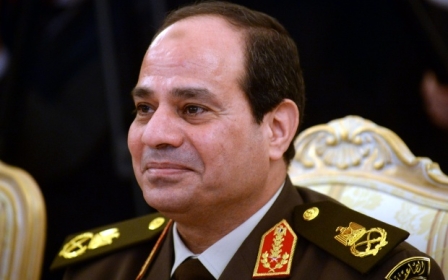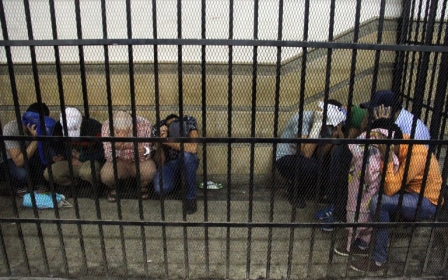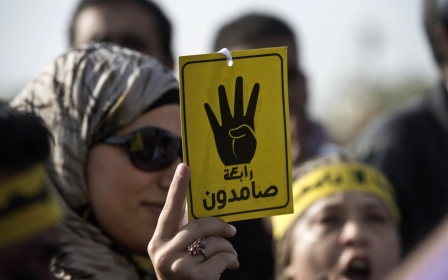Arresting gay people isn't the way to deal with AIDS

Today is the first hearing for the trial of at least 26 men alleged to be taking part in sexual activities at a bathhouse in central Cairo. Over the last two weeks, Egypt’s human rights activists have responded with furore at the sting operation and broadcasted arrest of these men.
The sting operation, organised by an investigative television programme called “The Hidden”, was aimed at uncovering the second largest source of spreading AIDS in Egypt (the first being the use of needles for drugs use), according to the show’s host Mona Iraqi. It was intended to coincide with the awareness raising World Aids Day on 1 December.
A statement released by 10 Middle Eastern and North African rights groups condemned the arrests as a “continuation of a vicious security campaign launched by the state, carried out by its morals police, against gay and transgender people”.
It was the largest mass arrest of individuals on the charge of practicing “debauchery” since the Queen Boat raid in 2001, when 52 men were detained from a floating disco on the Nile for their perceived sexuality.
While homosexuality is legal in Egypt, rights groups have documented a rise in the numbers of those arrested among the gay community, more than150 people over the last year, with many being detained from their homes. They are often charged with debauchery or insulting public morals.
Last month, eight men accused of attending a marriage-like ceremony on the Nile were jailed for three years with the court ruling that the defendants had endangered public morality after a video appeared to show an exchange of vows between two men.
Scott Long, the former director of Human Rights Watch’s lesbian, gay, bisexual and transgender (LGBT) programme, who has long been documenting the crackdown on gay people in Egypt, commented: “I hadn’t believed tensions around sexuality and gender could rise higher in Egypt. But they have.”
Iraqi has since gone on to defend the sting operation, in which she informed the police of what her team had found a week before the raid took place, as an act of dealing with “sex trafficking in a public place”.
“My whole issue is not homosexuality,” she wrote on her Facebook page. “I managed to investigate and film this case to stress on the fact that we need help insuring a healthier life for such groups, since it's an unacceptable issue for the Egyptian society.”
It’s a change of tone from her first show, when the emphasis was on uncovering the “biggest den of group perversion”, according to her remarks also on Facebook.
If Iraqi is genuine in her claim that she wants to insure a healthier life for “such groups”, in other words people having unprotected sex (which is how AIDS can be spread), allegedly for money, then organizing a sting operation by a police force known for its brutality is not the way to do it.
Rights groups and journalists have long been documenting the human rights abuses practiced by Egyptian police, including the rape of detainees. Men alleged to be gay have also been subjected to forced anal examinations, in which the naked subject is made to bend as doctors searching for “marks” of “sodomy” dilate, peer into, and in some cases insert objects into his anal cavity. According to Human Rights Watch, by international standards, this amounts to torture.
Iraqi’s actions and that of the show will only serve to further stigmatise one of the most vulnerable groups in Egyptian society, driving them deeper underground than they already are, and contributes very little to positive awareness raising about how to avoid contracting HIV, and AIDS, of which she makes no distinction.
AIDS is the final stage of an HIV infection. According to the UK’s national health service, “with early diagnosis and effective treatment, most people with HIV will not go on to develops AIDS". That’s not the message we get from Iraqi’s show.
Iraqi and her show “The Hidden” would have made a more positive contribution on World Aids Day by raising awareness about safe sex and the need to use condoms. She could have teamed up with the Ministry of Health to offer out free condoms.
She may have also highlighted Egypt’s poor spending rates on healthcare. It invests less than 5 percent of the government’s total budget in health, which is half the regional average and a third of its commitment under the Abuja Declaration. More spending on healthcare might mean better AIDS prevention rates.
Or, she could have highlighted the poor socio-economic factors that drive people to offer sexual services for money, which some of the men on her show alleged to do. Separately, one married woman has said she has sex for money just to pay for her children’s private tuition classes, which they need to supplement the poor level of education they get during the day.
She may even have done a show about why, in a country where homosexuality is legal, it still remains hidden. Instead, Iraqi and her show went after the victims. And, in doing so, the show has made it even harder to be gay in Egypt. Although it is legal, it is rarely visible in public.
Public condemnation of those men in the bathhouse, which Iraqi aired in her latest show justifying the crackdown and responding to the criticism, may encourage ordinary citizens to take the law into their own hands for anyone they suspect of such acts. That’s worrying in a country where people have been lynched for their religious beliefs, or dragged by the back of a car for allegedly harassing a woman.
According to gender rights researcher, Dalia Abdel Hameed, the rise in the crackdown on gay people is an apparent attempt by the current government to be perceived as more socially conservative than its Islamist predecessor and therefore just as concerned about the upkeep of public morals.
If that’s true, then for anyone that cares about gender equality that is also a worrying trend. Under the former government, the Muslim Brotherhood condemned a UN document aimed at ending violence against women saying it violated principles of Islamic law and would destroy the institution of family by giving women more rights, such as the right to complain about marital rape and promote equal rights between men and women in the family.
Being even more conservative than the Islamists means having rigid views about what it means to be a man and woman in society, and what roles both perceived genders ought to have – being openly gay in a socially conservative Muslim society, as Egypt is, wouldn’t be one of them.
Using the security apparatus to deal with an issue that is far more complex than a brutal jail cell can fix is the same logic that arrests men for sexual harassment without dealing with the underlying causes of the problem, including those acts of sexual harassment committed by the security apparatus itself. It is the same logic that rounds up thousands of people in the name of a “war on terror”, while creating an environment that is increasingly repressive and draconian.
Arresting men at a bathhouse isn’t the way to deal with AIDS, or insuring a healthier life for “such groups”.
- Nadine Marroushi is a British-Palestinian journalist who has worked for Bloomberg and the English edition of Al-Masry Al-Youm (also known as Egypt Independent), and as a freelance journalist has written for The National newspaper in the UAE, and the London Review of Books blog. She has also been published by the Financial Times, and other international publications.
The views expressed in this article belong to the author and do not necessarily reflect the editorial policy of Middle East Eye.
Photo credit: Egyptian men on trial for doing a video prosecutors claimed was of a gay wedding enter the courtroom in Cairo on 1 November 2014 (AFP)
New MEE newsletter: Jerusalem Dispatch
Sign up to get the latest insights and analysis on Israel-Palestine, alongside Turkey Unpacked and other MEE newsletters
Middle East Eye delivers independent and unrivalled coverage and analysis of the Middle East, North Africa and beyond. To learn more about republishing this content and the associated fees, please fill out this form. More about MEE can be found here.





